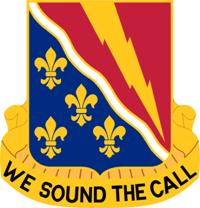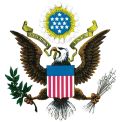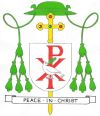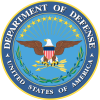230th Signal Battalion, Tennessee Army National Guard: Difference between revisions
Knorrepoes (talk | contribs) m (Text replacement - "{{us}}" to "") |
Knorrepoes (talk | contribs) m (Text replacement - "↵↵↵Literature" to " Literature") Tags: Mobile edit Mobile web edit |
||
| (6 intermediate revisions by the same user not shown) | |||
| Line 1: | Line 1: | ||
''' {{uc:{{PAGENAME}}}} ''' | ''' {{uc:{{PAGENAME}}}} ''' | ||
{|align="center" | {|align="center" | ||
|align="center"|[[File:{{PAGENAME}}.jpg|center|350 px|Coat of arms (crest) of {{PAGENAME}}]] <br> (Coat of Arms) | |||
|align="center"|[[File:{{PAGENAME}}.jpg|center|350 px| | |align="center"|[[File:{{PAGENAME}}duib.jpg|center|350 px|Coat of arms (crest) of {{PAGENAME}}]] <br> (Distinctive Unit Insignia) | ||
|} | |} | ||
| Line 24: | Line 21: | ||
The color yellow refers to the unit’s original assignment to the 30th Armored Division. The wavy bendlet denotes overseas duty and the two divisions of the shield are used to signify World Wars I and II. The four fleurs-de-lis allude to service in Europe where four awards were earned by elements of the organization during those wars. The lightning bolt is symbolic of speed and direct action, thus signifying efficiency of signal communications. | The color yellow refers to the unit’s original assignment to the 30th Armored Division. The wavy bendlet denotes overseas duty and the two divisions of the shield are used to signify World Wars I and II. The four fleurs-de-lis allude to service in Europe where four awards were earned by elements of the organization during those wars. The lightning bolt is symbolic of speed and direct action, thus signifying efficiency of signal communications. | ||
The | The arms were originally approved on 18 May 1967. It was cancelled on 6 December 1973. On 18 August 1981, the coat of arms was reinstated, the symbolism revised to accurately reflect historic events and the description of the crest changed to correctly reflect the colors of the wreath. The Distinctive Unit Insignia was originally approved on 2 October 1967. It was amended to revise the symbolism to accurately reflect historic events on 18 August 1981. | ||
[[Literature]]: Image and Information from The Institute of Heraldry, US Army. | |||
{{us}} | |||
{{media}} | |||
[[Category:Military heraldry of the United States]] | [[Category:Military heraldry of the United States]] | ||
[[Category:Army heraldry]] | [[Category:Army heraldry]] | ||
[[Category:Granted 1967]] | [[Category:Granted 1967]] | ||
Latest revision as of 18:50, 20 August 2023
230TH SIGNAL BATTALION, TENNESSEE ARMY NATIONAL GUARD
| (Coat of Arms) |
(Distinctive Unit Insignia) |
Official blazon
Shield: Per bend Azure and Gules, a bendlet wavy Argent between four fleurs-de-lis in base and, issuing from chief, a lightning bolt bendwise all Gold.
Crest: That for the regiments and separate battalion of the Tennessee Army National Guard: On a wreath of the colors, Argent and Azure, upon a mount Vert a hickory tree Proper charged with three mullets one and two Argent.
Motto: WE SOUND THE CALL.
Distinctive Unit Insignia. Description: A gold color metal and enamel device 1 1/8 inches (2.86cm) in height consisting of a shield blazoned: Per bend Azure and Gules, a bendlet wavy Argent between four fleurs-de-lis in base and, issuing from chief, a lightning bolt bendwise all Gold. Attached below the shield a motto scroll inscribed “WE SOUND THE CALL” in black letters.
Origin/meaning
The color yellow refers to the unit’s original assignment to the 30th Armored Division. The wavy bendlet denotes overseas duty and the two divisions of the shield are used to signify World Wars I and II. The four fleurs-de-lis allude to service in Europe where four awards were earned by elements of the organization during those wars. The lightning bolt is symbolic of speed and direct action, thus signifying efficiency of signal communications.
The arms were originally approved on 18 May 1967. It was cancelled on 6 December 1973. On 18 August 1981, the coat of arms was reinstated, the symbolism revised to accurately reflect historic events and the description of the crest changed to correctly reflect the colors of the wreath. The Distinctive Unit Insignia was originally approved on 2 October 1967. It was amended to revise the symbolism to accurately reflect historic events on 18 August 1981.
Literature: Image and Information from The Institute of Heraldry, US Army.
US heraldry portal
This page is part of the US heraldry portal |
Heraldry of the World |
|
US heraldry:
|
Ecclesiastical Heraldry of the USA:
Military Heraldry: |
Contact and Support
Partners:
Your logo here ?
Contact us
© since 1995, Heraldry of the World, Ralf Hartemink 
Index of the site
















